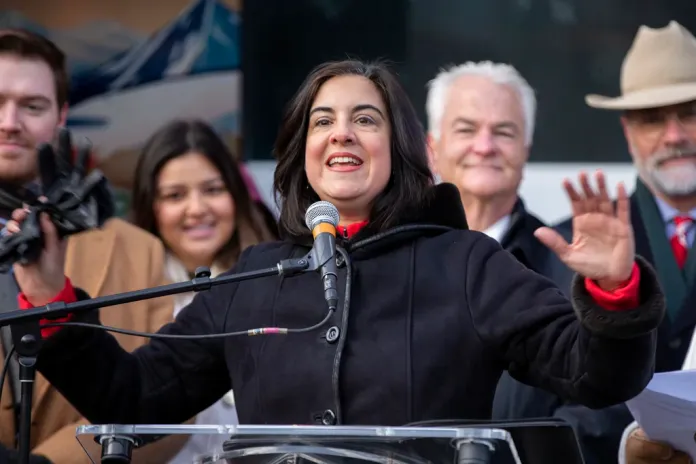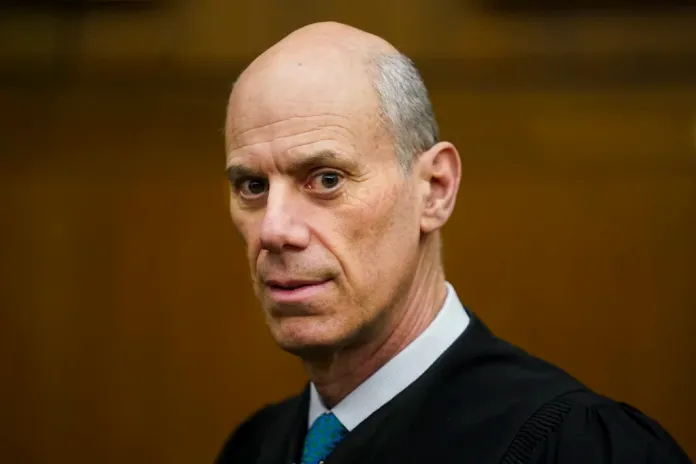7 Key Moments From Justice Barrett’s Latest Sit-Down Interview
Associate Justice Amy Coney barrett recently participated in an in-depth interview with Peter Robinson of the Hoover Institution,discussing her judicial beliefs and various Supreme Court-related issues. Barrett elaborated on originalism, explaining that while it had to establish itself against the prevailing “living constitution” approach during the Warren Court era, it was historically the dominant method of constitutional interpretation. she noted that the decline in constitutional amendments coincided with the rise of judicial activism through living constitutionalism, as courts increasingly enacted changes typically reserved for amendments.
Barrett also addressed debates over stare decisis (adherence to precedent), aligning more closely with justice Scalia’s cautious approach to overturning precedent rather than Justice Thomas’s more frequent willingness to question past rulings. She discussed the Court’s landmark 2022 dobbs decision, emphasizing that it returned the issue of abortion to the democratic process rather than imposing a constitutional right or restriction.
The interview covered the topic of nationwide injunctions, with Barrett criticizing expansive use of such injunctions by lower courts as disruptive to the constitutional separation of powers. Regarding congress, Barrett stressed that all branches must fulfill their constitutional duties and that the judiciary should not overstep its role even if other branches fail to act properly.
In closing, Barrett highlighted the importance of an engaged citizenry in upholding the rule of law, stressing that respect for the Constitution depends not only on courts but also on public commitment, societal norms, and patriotism.
The U.S. Supreme Court may be busy juggling cases from its ongoing term, but that hasn’t stopped Associate Justice Amy Coney Barrett from making time to speak directly to the American people.
On Oct. 31, the Trump appointee participated in a sit-down interview with the Hoover Institution’s Peter Robinson. Released on Wednesday, the more than hour-long exchange covered Barrett’s recently released book and a myriad of issues relevant to the Supreme Court and America’s ongoing political discourse.
From the origins of originalist jurisprudence to the limited power of lower courts, here are some of the most compelling remarks from one of SCOTUS’s most junior justices.
Originalism
Before delving into more modern issues, Robinson began his conversation with Barrett by discussing originalism, the judicial philosophy of interpreting the Constitution as originally written at the time it was adopted.
After playing a clip of Associate Justice Samuel Alito’s analysis of originalism’s origins during his interview with Robinson several months ago, the Hoover policy fellow described how originalism “had to fight to establish itself” when its early pioneers like former Associate Justice Antonin Scalia — for whom Barrett clerked — first joined the Supreme Court. He further noted that Barrett and her fellow Trump appointees are “of a different generation” where originalism “is already, in some way, established.”
While agreeing with Alito’s assessment that “originalism became prominent as a theory, and it became self-conscious as a theory, at the time that Justice Scalia and some of the early pioneers of originalism … began writing about it,” Barrett added that “when you look back at the 19th century, originalism is what the court was doing in most cases.”
“It had never had to defend itself,” Robinson said, to which Barrett replied, “Exactly.”
“The story of originalism is really that in the Warren Court years, and the more the court veered from more traditional tools of constitutional interpretation and became more creative, and the living constitution became the interpretive theory du jour, then originalists had to pause,” Barrett said. “And if they were gonna criticize what had become dominant in the Warren and Burger Courts as this more living constitutionalism [took root], they had to articulate, ‘Well, what had been going on before? What was the old way and why is it the right way?’”
Judicial Activism and the Amendment Process
When mentioning criticisms of originalism, Robinson asked Barrett to respond to a recent Atlantic article by Harvard Law School Professor Jill Lepore, who wrote in part, “Originalism took hold from the failure of conservatives to change the Constitution by democratic means — by means of amendment.” The Trump appointee noted the apparent correlation between the rise of living constitutionalism with the “drop off” in amendments being ratified to the Constitution, and how such judicial activism discouraged the need for amending the document through traditional means.
“I think amendments dropped off just as living constitutionalism was taking hold, and … that when you look at the pattern of constitutional amendment, what you see is a shift towards, ‘Well, why do we need to amend the Constitution, because we can go to the Supreme Court to functionally get the amendment we want through case law?’” Barrett said. “I think the conventional view is that … the main reason that amendments kind of died out was that the court was doing the work of amendment.”
Reexamining Precedent
The conversation later shifted to differing originalist views on stare decisis, the doctrine that courts will abide by past precedent when deciding cases.
Robinson noted the opposing views of Scalia and Associate Justice Clarence Thomas, and how the former was much more reluctant to reexamine precedent than the latter. The Hoover fellow referenced remarks Thomas reportedly gave in a recent interview with him, in which the justice said, “The Supreme Court is the end of the line. If something is obviously wrong, we should question it and not just go along.”
When asked which of the justices’ philosophies on stare decisis she more closely aligns with, Barrett said, “Closer to Justice Scalia.”
“Justice Thomas’ point, and I agree with it, is that the ratified text of the Constitution always has to trump. That is the law. But I think the way that you instantiate that can be different,” Barrett said. “I think one area in which he really differs from Justice Scalia — in which I would align more with Justice Scalia — is [that] Justice Thomas would affirmatively, in a case, as he says in the quote that you read, question precedents.”
She continued, “If the question is called, that’s one thing. Then it’s front and center in front of the court and the court has to decide: Should we overrule this case or not? That’s a different thing than if precedents lie in the background or if they’re part of the reasoning, and the court just, on its own, decides we should examine that. I don’t want to decide the case in front of me if there are cases in the background or that are relevant along the way that people might not have challenged in this case, but that might be wrong. I think you let those sleeping dogs lie.”
“Whereas Justice Thomas might be more willing to dig into the background a little bit?” asked Robinson, to which Barrett replied, “Yes.”
Dobbs and Democracy
The discussion on stare decisis drifted into the Supreme Court’s 2022 Dobbs v. Jackson Women’s Health Organization decision, which overturned longstanding precedent first established in Roe v. Wade (1973) regarding an imaginary “constitutional right” to abortion.
At one point in the exchange, Robinson referenced critics of the court’s Dobbs ruling who argue that the decision “somehow represented an assault on democracy.” He then asked Barrett, “But in fact, it expanded what we could decide democratically, didn’t it?”
“Yes, that was part of the point, because when the court … says that something is constitutionally protected, it inhibits the lawmaking process. And then legislatures are then hemmed in, so that they can’t legislate on that topic. They can’t regulate,” Barrett said. “So, what Dobbs did is say, ‘This is not a pro-life or a pro-choice decision. We’re not taking a position on whether abortion is … a social good or a social ill. We’re just throwing it to the democratic process.’ And we’ve seen that play out across the states, many of whom have amended their constitutions to address abortion.”
Nationwide Injunctions
Robinson later probed Barrett on the issue of nationwide injunctions and separation of powers. He noted how, “On one hand, it cannot be the case that any president of the United States gets to rule by executive order, unchallenged executive order.” He then added, “On the other hand, we have over 670 district court judges, and it cannot be the case that each of those judges gets to issue a national injunction.”
“So, how do we think about … that weighting problem?” Robinson asked.
In her response, Barrett discussed the Supreme Court’s recent Trump v. CASA decision, which limited lower courts’ use of nationwide injunctions to halt the enactment of certain policies for the entire country. She specifically alluded to Associate Justice Ketanji Brown Jackson’s solo dissent, and how the arguments put forward by the Biden appointee regarding the power of the judiciary to issue sweeping universal injunctions don’t comport with how the constitutional system works.
“Even if you assume that the [president’s] executive order was unlawful … fighting fire with fire isn’t the way to approach it because courts need to stay in their lane too,” Barrett said. “So, the whole system will just crumble if you take a ‘we’re gonna fight fire with fire’ approach. You can’t criticize one branch for being outside of its lane by veering outside of your lane to take it down.”
Ineffective Congress
The role of Congress also became a significant part of Robinson’s discussion with Barrett. The Hoover fellow noted how the lawmaking body has often demonstrated an inability and unwillingness to fully embrace its constitutional role, prompting him to ask the justice, “If Congress doesn’t do its job, what position does that put you in?”
While declining to criticize a separate branch of government, Barrett harkened back to their earlier discussion about how past Supreme Courts’ adoption of living constitutionalist theory seemingly hindered the amendment process. She emphasized that “all of the branches have to be doing their job for the right equilibrium to be there,” and that one branch — including the judiciary — cannot exceed its powers simply because another won’t fulfill its role.
“I think my view, and I said this with respect to CASA, is that if one of the other branches is either not doing what they should be or exceeding their powers, the answer to that counterweight can’t be that we exceed ours,” Barrett said.
An ‘Engaged Citizenry’
In concluding his interview with Barrett, Robinson asked the justice to explain a quote from her book, which reads, “We cannot legislate a culture of respect for law into existence. Our constitutional project can only succeed if Americans invest in it.”
The Trump appointee reasoned that “the Supreme Court and the courts cannot do everything,” and that it is incumbent upon the American people to be engaged in the body politic in order for the country to thrive.
“We can decide the cases in front of us, and we can uphold the Constitution. So, that oath that I took, I can discharge that. But the people have to want that,” Barrett said. “You were asking before about constitutional amendments. If people … don’t like the status quo, if they don’t like it the way everything is operating, we should have an engaged citizenry that has a movement to amend the Constitution. I think that the rule of law, commitment to the Constitution, a lot of it is done by norms. A lot of it is done by what the American people want. A lot of it is done by patriotism.”
Shawn Fleetwood is a staff writer for The Federalist and a graduate of the University of Mary Washington. He previously served as a state content writer for Convention of States Action and his work has been featured in numerous outlets, including RealClearPolitics, RealClearHealth, and Conservative Review. Follow him on Twitter @ShawnFleetwood
" Conservative News Daily does not always share or support the views and opinions expressed here; they are just those of the writer."




